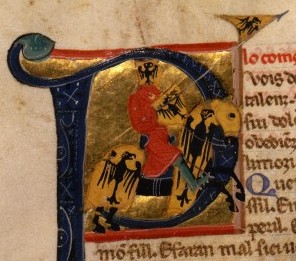Our subject was also a Crusade leader, but not of a Crusade that gets talked about, or even included in the numbering system: it is simply called the "Crusade of 1101."
He invited Pope Urban II—who had called for the Crusade in November 1095—to his court for Christmas of that year, during which Urban urged William to take up the Cross. William was more interested, however, in whether his rival, Count Raymond IV of Toulouse, would go on Crusade, leaving Toulouse unguarded (he did). William's wife, Philippa of Toulouse, was Raymond's niece, and William thought she could make a claim to the territory. The pair did capture Toulouse in 1098, and were subsequently threatened with excommunication.
What William is most known for now, however, is his career as the first known troubadour. There are 11 songs attributed to him. A 13th century vida says of him:
The Count of Poitiers was one of the most courtly men in the world and one of the greatest deceivers of women. He was a fine knight at arms, liberal in his womanizing, and a fine composer and singer of songs. He traveled much through the world, seducing women.
He did in one song admit to deceiving two women. Several of his songs show an attitude toward women in the courtly love tradition, however, in that the subject is called midons, "master":
Every joy must abase itself,
and every might obey
in the presence of Midons, for the sweetness of her welcome,
for her beautiful and gentle look;
and a man who wins to the joy of her love
will live a hundred years.
The joy of her can make the sick man well again,
her wrath can make a well man die,
Orderic Vitalis tells us that he wrote and performed "witty measures" of his adventures on Crusade, but the only Crusade in which he participated, as mentioned, was the Crusade of 1101. I'll tell you what happened with that tomorrow.

No comments:
Post a Comment
Note: Only a member of this blog may post a comment.